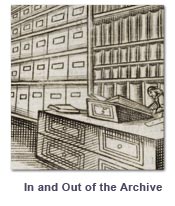Date/Time
Friday, January 23, 2009–Saturday, January 24, 2009
All Day
Location
UCLA William Andrews Clark Memorial Library
2520 Cimarron Street
—a conference organized by Randolph C. Head, University of California, Riverside and Jennifer S. Milligan, Marymount Manhattan College
co-sponsored by Department of History, University of California, Riverside;
Center for Ideas and Society, University of California, Riverside; and Department of Information
Studies/Center for Information as Evidence, University of California, Los Angeles
—with special thanks to the Thyssen Foundation

Over the last decade archives have become increasingly prominent as both sites of and challenges for humanistic research. This development reflects the contemporary information culture but also responds to recent trends in the humanities across the disciplines. The “archival turn” in the human sciences is echoed in historians’ new approaches to archives as well. Historians have been working in archives since at least the eighteenth century and have been questioning how to use archives properly since the nineteenth, but it was surprisingly late before they looked at archives as socially, culturally, and politically situated phenomena that can be used as evidence in themselves.
The conference takes up these issues, with particular attention to archives in Europe from the late Middle Ages to the nineteenth century, by combining the research of scholars working on the archives that developed during this period with the theoretical insights of scholars working in other archival contexts. The challenges of working with early medieval archives, or of finding the silenced voices of women and the colonized in later archives, have led to particularly stimulating theoretical reflection that will be valuable to all investigations that take up archives as their subjects. By bringing together the insights of theorists, historians and archivists in an intensive setting, this conference hopes to enrich the field and to enrich the participants’ perspectives on archival processes and contexts.
Program
Session 1
Chair: Deborah Harkness, University of Southern California
Simon Teuscher, Universität Zürich
“Abecedaria, Repertoria, and Collectanea: Mobilizing Legal Regulations at the End of the Middle Ages”
Filippo de Vivo, Birkbeck College, University of London
“’The Heart of the State’: Government by Archive in Early Modern Venice”
Randolph C. Head, Univeristy of California, Riverside
“Inventories, Indexes and Registries: A Comparative Look at Knowledge Practices in European Archives, 1500–1700”
Session 2
Chair: Anne Gilliland, Univeristy of California, Los Angeles
Markus Friedrich, Goethe Universität Frankfurt/Boston College
“Archives and the Concept of Government: Examples from Early Modern Catholicism”
Eric Ketelaar, Universiteit van Amsterdam
“Records In and Archives Out: Early Modern Cities as Creators of Records and Communities of Archives”
Jacob Soll, Rutgers University
“The Ancient Constitution and the Early Modern State: How Colbert’s Archives Shaped Policy in the Age of Louis XIV”
Session 3
Chair: Margaret C. Jacob, University of California, Los Angeles
Ben Kafka, New York University
“The Disciplined State: Archives and Accountability in the French Revolution”
Jennifer S. Milligan, Marymount Manhattan College
“Creating the ‘Inviolable’ Archive: Documents In and Out of the Archives of Second Empire France”
Daniela Saxer, Universität Zürich
“Dislocating Historical Objects: Historians’ Appropriation of Sources in Nineteenth-Century Austria and Switzerland”
Roundtable Discussion — Theoretical Perspectives and Archival Practices
Warren C. Brown, California Institute of Technology
Heidi Brayman Hackel, University of California, Riverside
Betty Joseph, Rice University

